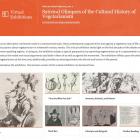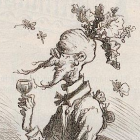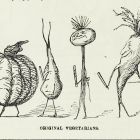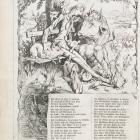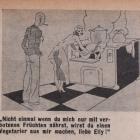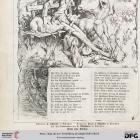Meat Ban: Pleasure and Pain, Asceticism, and Hypocrisy
Rules and prohibitions of any kind have always provoked caricaturists. Their ridicule is directed not only against the prohibitions and their preachers, but also against those who hypocritically break the rules or reinterpret them according to their own needs and weaknesses.

Vegetarianer-Congress (Vegetarian congress). Illustration and possibly also the poem by Carl von Stur (1840–1905), 1886. The man standing on the left side is meant to be Friedrich Eckstein, the president of the congress committee; on the left side we see Ernst Hering, who was one of the keynote speakers of the historical congress.
Vegetarianer-Congress (Vegetarian congress). Illustration and possibly also the poem by Carl von Stur (1840–1905), 1886. The man standing on the left side is meant to be Friedrich Eckstein, the president of the congress committee; on the left side we see Ernst Hering, who was one of the keynote speakers of the historical congress.
Courtesy of ANNO/Österreichische Nationalbibliothek.
Originally published in Der Floh 26 (September 1886): 4.
Click here to view source.
 This work is licensed under a Creative Commons Public Domain Mark 1.0 License.
This work is licensed under a Creative Commons Public Domain Mark 1.0 License.
An early cartoon from the Austrian satirical paper Der Floh shows a “Vegetarian congress,” which satirizes the vegetarian lifestyle with a meatless banquet. In the accompanying poem, one of the keynote speakers, Ernst Hering, proudly praises the vegetarian menu. His historical speech bore the title “On the importance of vegetarianism for the preservation of the people’s power.”
One of the punch lines of the caricature is the image of the cow, which hovers above everything like a worshiped golden calf. Ironically, the herbivore and ruminant animal that is spurned as a food is explicitly chosen as a role model:
Zum Teufel das Fleisch! Zu Teufel das Aas!
Wir lassen es dem Schinder
Und leben einfach naturgemäß
Wie unsere Muster, die – Rinder!
To hell with meat! To hell with carcasses!
We’ll leave that to the knacker
And just live naturally
Like our role models, the cattle!
The enemy, in contrast, is the carnivore. However, the declared vegetarians break their principles—the second punch line is directed at their hypocrisy and double standard:
Die Carnivoren, das ekle Gezücht,
Verschwender sind’s und Prasser,
Wir trinken nur, wenn’s Niemand sieht,
Auch Pilsner bisweilen statt Wasser.
Carnivores, the disgusting brood,
How they waste and how they squander,
We only drink when no one’s looking,
Sometimes pilsner instead of water.
A third punch line is the “chorus of the waiters” chanting at the end of the poem, who are happy that they are left with the roast since the gentlemen only order side dishes. Indeed, the vegetarians were sometimes accused of hypocrisy. On the one hand, this was due to their often dogmatic approach, which might have hindered more than helped their reform efforts. On the other hand, there were misunderstandings because some vegetarians did not consider a radical renunciation of meat as the essential element of their reformist worldview. In line with this view was the widespread but hardly plausible claim that the word “vegetarian” derived not from “vegetable,” but from the Latin “vegetus,” which means “lively” or “alive” and therefore is not necessarily synonymous with a meat-free diet. It can be assumed that some members of vegetarian societies occasionally ate meat, although the meatless diet was definitely regarded as morally superior (Barlösius 1997, 8).
Since vegetarian societies began to spread and organize events in Germany, their missionary attitude and their attitude of moral superiority have been ridiculed.
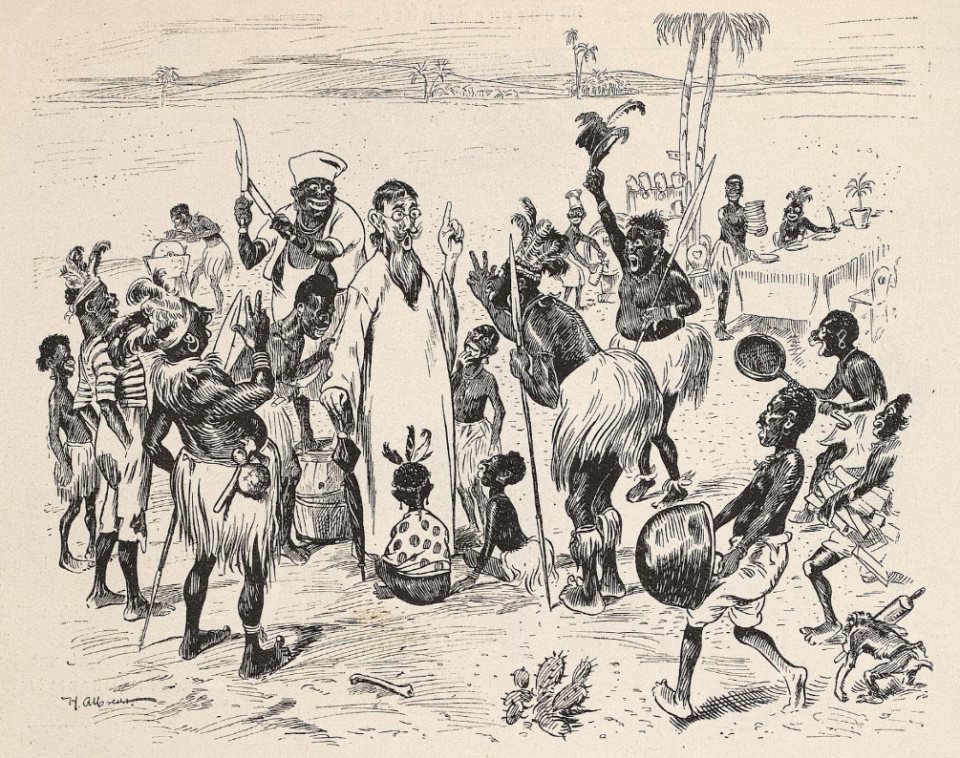
Unangenehme Neugierde (Painful curiosity). Henry Albrecht (1857–1909), 1901.
Unangenehme Neugierde (Painful curiosity). Henry Albrecht (1857–1909), 1901.
Courtesy of Universitätsbibliothek Heidelberg.
Originally published in Fliegende Blätter 114, no. 2892–2917 (1901): 52–53.
Click here to view source.
 This work is licensed under a Creative Commons Public Domain Mark 1.0 License.
This work is licensed under a Creative Commons Public Domain Mark 1.0 License.
The accompanying text:
Unangenehme Neugierde.
Ein Professor, der Vegetarianer war, ging in die Wüste und hielt den Kannibalen eine Rede über die Verwerflichkeit des Fleischessens. – Diese hörten gläubig die Rede des Herrn Professors an und brachten ihm am Schlusse derselben eine großartige Ovation. “Nicht wahr”, sagte er, “Ihr werdet meinen Rath befolgen?” – “Wir schwören Dir’s”, rufen Alle – “aber noch einmal, und zwar heute zum letzten Mal, wollen wir Fleisch essen, damit wir auch wissen, wie das Fleisch eines Vegetarianers schmeckt!”Painful curiosity.
A professor who was a vegetarian went into the desert and gave a speech to the cannibals about the reprehensibility of eating meat. The cannibals faithfully listened to the speech of the professor, and at the end of it awarded him with great applause. “You will obey my advice” he said, “won’t you?”—“We swear it to you,” everybody shouted, “but one more time, and today for the last time, we want to eat meat, so that we know what the flesh of a vegetarian tastes like!”
The picture above depicts a professor and vegetarian in a missionary’s robe preaching with his index finger raised, surrounded by cannibals, who are already whetting their knives and procuring the cooking utensils during his sermon. When he asks for their promise to stop eating meat, they announce a last carnivorous celebration—with the clever excuse of wanting to know what a vegetarian would taste like. The professor’s own zeal ultimately does great harm to him. The cartoon, however, is more complex than it seems at first glance. Although his moral zeal is mocked, the vegetarian epitomizes the civilized among the wild carnivores. Thus the caricature also aligns meat-eaters in German society around 1900 with barbarians and juxtaposes them with the noble “civilized” vegetarians. It also shows us how cartoonists and magazine editors from all political camps inconsiderately spread racial prejudices in the service of humor.
Ridicule was directed not only at the rules and principles of the vegetarians, but also at their societies. What they asked of their members was considered “too rigid,” as the caricature Zu streng already reveals in its title.
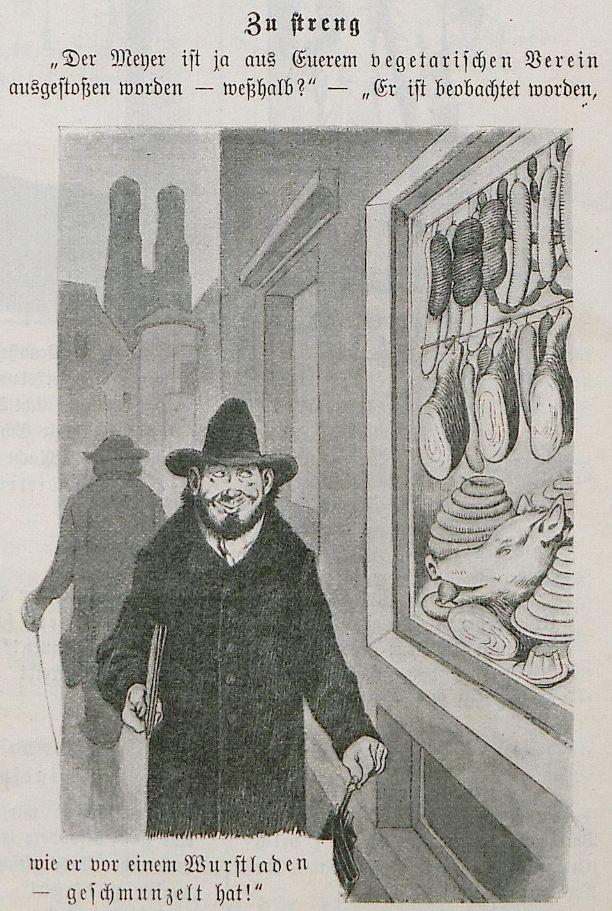
Zu streng (Too rigid). Hermann Schlittgen (1859–1930), 1894.
Zu streng (Too rigid). Hermann Schlittgen (1859–1930), 1894.
Courtesy of Universitätsbibliothek Heidelberg.
Originally published in Fliegende Blätter 101, no. 2553–2578 (1894): 221.
Click here to view source.
 This work is licensed under a Creative Commons Public Domain Mark 1.0 License.
This work is licensed under a Creative Commons Public Domain Mark 1.0 License.
Zu streng
“Der Meyer ist ja aus Euerem vegetarischen Verein ausgestoßen worden – weshalb?” – “Er ist beobachtet worden, wie er vor einem Wurstladen – geschmunzelt hat!”Too rigid
“I hear that Meyer was expelled from your vegetarian club— why?”—“He has been seen in front of a sausage shop—smiling!”
The joke, of course, lies in the excessively exaggerated punishment of a completely harmless case of “misconduct.” At the same time, the cartoon implies that a completely “natural,” “innate,” carnal lust cannot be suppressed.
The cartoon Schlechte Ausrede (“Bad excuse”) also reveals in its title how to interpret the justification provided by the caught, apparently hypocritical vegetarian:
Schlechte Ausrede.
A (zu B, der ein Vegetarianer ist und soeben eine Wurst verzehrt): ”So, Herr Kräutelmeier, hab’ ich Sie endlich einmal erwischt!”B: “Da täuschen Sie sich, – ich ess’ nur den Knoblauch heraus!”
Bad excuse.
A (to B, who is a vegetarian and at that very moment consuming a sausage): “Well, Mr. Kräutelmeier, I’ve finally caught you!”B: “You’re wrong—I’m just picking out the garlic!”

Schlechte Ausrede (Bad excuse). Emil Reinicke (1859–ca. 1942), 1885.
Schlechte Ausrede (Bad excuse). Emil Reinicke (1859–ca. 1942), 1885.
Courtesy of Universitätsbibliothek Heidelberg.
Originally published in Fliegende Blätter 82, no. 2058–2083 (1885): 79.
Click here to view source.
 This work is licensed under a Creative Commons Public Domain Mark 1.0 License.
This work is licensed under a Creative Commons Public Domain Mark 1.0 License.
If we take the vegetarian at his word and believe his excuse, his eating of only the garlic in the sausage defeats the purpose of most ethical and social arguments for renouncing meat. At the same time, this cartoon hints at many contemporaries’ astonishment that people who could afford an expensive and sought-after product, i.e. meat, would voluntarily limit themselves to a vegetable diet.
More than 30 years later, the punch line in the cartoon Der Vorsichtige Wirt (“The cautious innkeeper”) no longer takes aim at the supposed double morality of the vegetarians, but instead assumes that only vegetarians can be trusted to sleep in the sausage chamber. It also shows that vegetarians in 1918 are no longer an unusual exception.
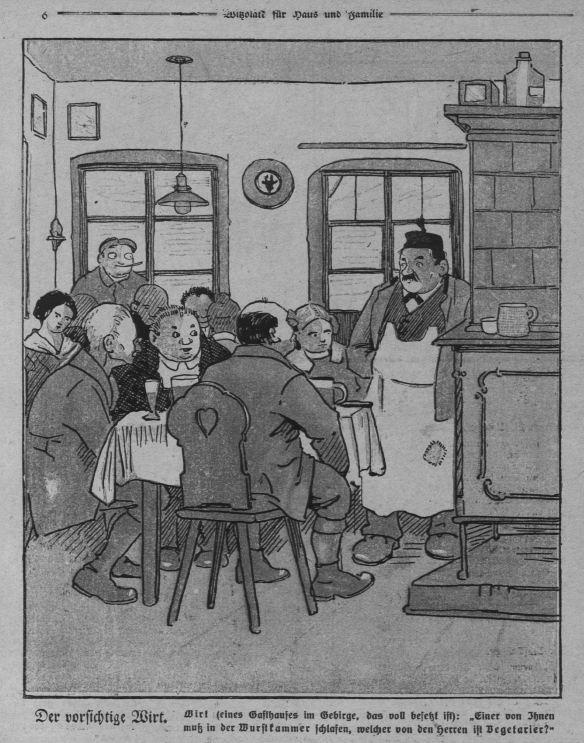
Der vorsichtige Wirt (The cautious innkeeper). Unknown artist, 1918.
Der vorsichtige Wirt (The cautious innkeeper). Unknown artist, 1918.
Courtesy of ANNO/Österreichische Nationalbibliothek. All rights reserved. Petition for orphan work status pending.
Originally published in Kikeriki 8 (September 1918): 14.
Click here to view source.
The copyright holder reserves, or holds for their own use, all the rights provided by copyright law, such as distribution, performance, and creation of derivative works.
Der vorsichtige Wirt.
Wirt (eines Gasthauses im Gebirge, das voll besetzt ist): “Einer von Ihnen muß in der Wurstkammer schlafen, welcher von den Herren ist Vegetarier?”The cautious innkeeper.
Innkeeper (at an inn in the mountains, which is fully occupied): “One of you must sleep in the sausage chamber; who of the gentlemen is a vegetarian?”




